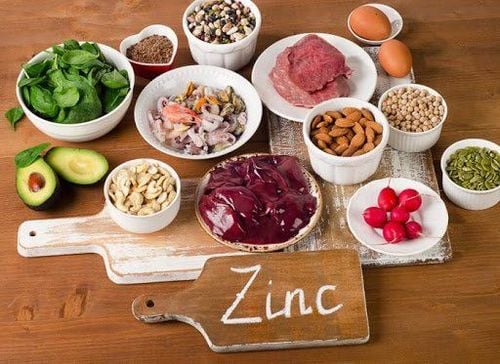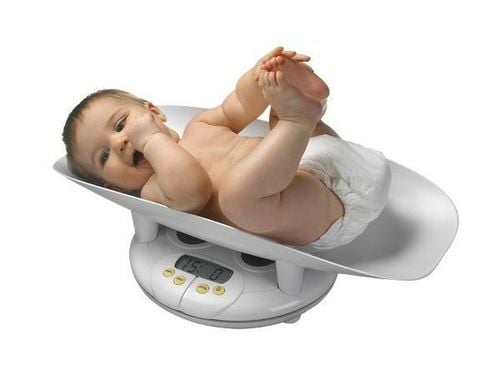1. Standard Development of a 10-Month-Old Baby
By 10 months old, most baby girls weigh an average of 8.5 kg (18.7 pounds), while baby boys weigh approximately 9.2 kg (20.2 pounds). In terms of height, the average for baby girls is around 71.4 cm (28.1 inches), while baby boys are 73.4 cm (28.9 inches). Overall, during this stage, babies can grow about 1.3 cm (0.5 inches) taller and gain approximately 400 grams heavier each month.
If a baby seems to not gain much weight, parents should consult a pediatrician about the specific case. However, typically, slower weight gain compared to the average is not a problem if the child appears happy, healthy, and achieves developmental milestones within the acceptable range.
However, if the child's growth index does not match the growth chart, and the child is diagnosed with slow weight gain or malnutrition, intervention measures must be implemented to timely adjust the child's physical development in the first year. Among these, the nutritional regime for a 10-month-old's diet requires special attention.

2. Food for 10-Month-Old Babies
At 10 months old, babies are no longer solely relying on breast milk or formula but are starting to adapt to complementary feeding. In reality, most 10-month-old babies can hold their milk bottle or drinking cup and grab food from their high chair tray as a form of self-directed complementary feeding. At this point, parents need to clearly understand the necessary nutritional requirements for their 10-month-old.
Parents can continue introducing healthy food options in the complementary diet, introducing one new food every three or four days. Babies can even start participating in family meals with small portions from the table.
Food options for 10-month-old babies can be much more diverse compared to when they first started solid foods. Fruits and vegetables need appropriate preparation. For example, avocado, banana, blueberries, peaches, boiled potatoes, sweet potatoes, carrots, and green beans can be pureed if soft or cut into small pieces for the baby to pick up and eat.
Additionally, 10-month-old babies can also eat pasta, cereals, dissolving rice cakes, tofu, eggs, and pure meat. Parents should use shredded chicken and ground turkey to make it easier for babies to eat. Beef can be cooked, pureed, and served with a spoon for the baby to scoop, which is also a delicious, nutrient-rich option.
Generally, meal ideas for 10-month-old babies have become much more diverse as they try and enjoy new foods. The key is to always feed the baby a variety of food groups, paying attention to providing a balance of protein, carbs, and healthy fats in each meal to ensure overall development.
3. What Should a 10-Month-Old Eat to Gain Weight?
With the basic diet outlined above, if a 10-month-old baby still hasn't reached the standard weight, parents should focus on increasing nutrient-rich foods as follows, which help the child gain weight effectively and prevent malnutrition.
3.1 Milk and Dairy Products
Choose partially skimmed milk specifically designed for children under one year old with mild underweight to supplement their nutrition instead of using regular formula milk.
Consider using milk instead of water when cooking soup or preparing cereal for complementary feeding. Give the baby yogurt or ice cream as snacks or desserts.
Add heavy cream and cheese to complementary foods like cream cakes, puddings, and flan. Or occasionally mix melted cheese with solid dishes to increase energy and create a delicious flavor

3.2 Using Meat in the Child's Diet
Parents can add a layer of ground meat on sandwich bread for the child. Focus on meat, fish, and chicken components in meals and have the child eat meat first before other foods like porridge or soup.
3.3 Fat Supplementation
Fat is crucial for child development at this stage. When preparing food, don't forget to add a bit of pure butter, vegetable butter, or cooking oil in each meal.
Add 1 teaspoon of olive oil to soup, vegetables, mashed potatoes, cooked cereals, pudding, rice, pasta, and stewed meat after preparation. Or sauté vegetables, meat, chicken, and seafood with olive oil, canola, or coconut oil to stimulate the child's taste.
3.4 Recommendations to Increase Calories and Protein for Quick Weight Gain
During this stage, try to feed the child 6 to 8 small meals or snacks daily. If the child is picky and can only eat a few bites each time, feed more frequently, every half hour. Avoid overfeeding favorite foods, as eating too much might make the child lose interest.
Caregivers should prevent the child from drinking too much water or milk right before meals, as this can make the child feel full and unable to eat the main meal.
Additionally, the child's sleep is equally important for weight gain. Ensure the child has a deep night's sleep, undisturbed by hunger, and 1-2 short daytime naps. This allows the child to convert energy into physical matter for weight and height growth during sleep instead of creating energy for crawling and playing all day.
In summary, what a 10-month-old should eat to gain weight concerns many parents of underweight or malnourished children. The above recommendations will help parents design nutrient-rich meals for quick weight gain. However, the child's natural development must always be respected. Abusing appetite stimulants or overly pressuring children can lead to overweight or obesity, which will negatively impact future development.
Moreover, 10-month-old children need 5mg of zinc daily to eat well and achieve or exceed standard height and weight. Zinc plays a role in most biological processes in the body, especially nucleic acid and protein synthesis. Zinc deficiency in body organs can lead to neurological disorders, increased irritability, etc. Therefore, parents need to understand zinc's role and provide zinc supplementation.
Besides zinc, parents should also supplement important vitamins and minerals like lysine, chromium, B-group vitamins, etc., to help children eat well, develop a good immune system, and boost immunity to minor illnesses.
Please frequently visit Vinmec.com and stay updated with useful information for caring for your baby and family.
Reference source: thebump.com - stjude.org - pregnancybirthbaby.org.au
To arrange an appointment, please call HOTLINE or make your reservation directly HERE. You may also download the MyVinmec app to schedule appointments faster and manage your reservations more conveniently.








